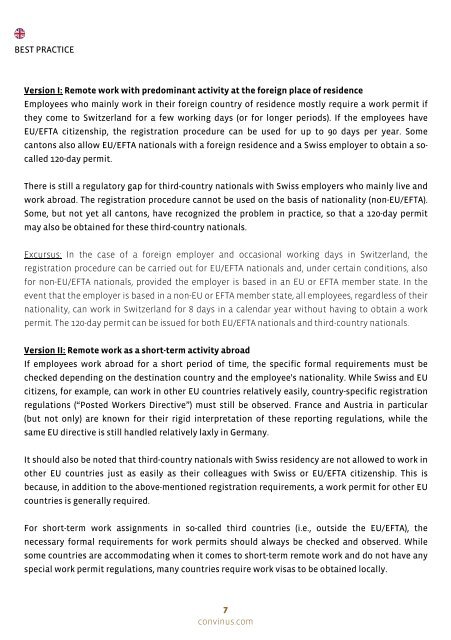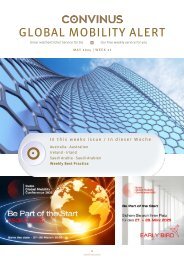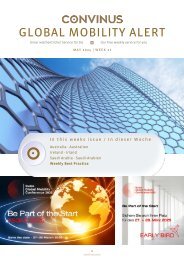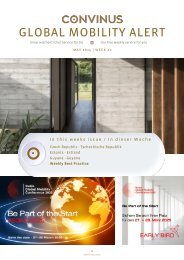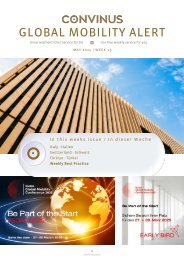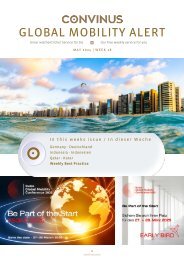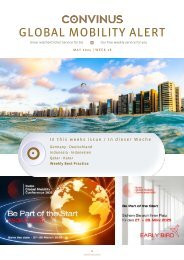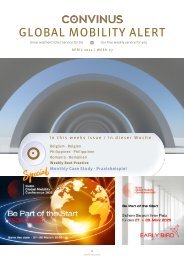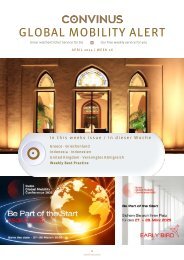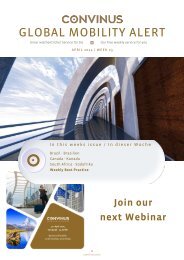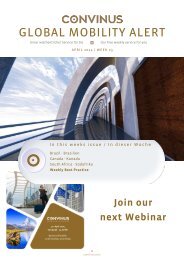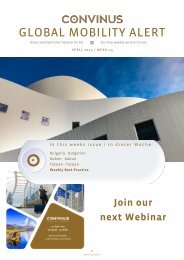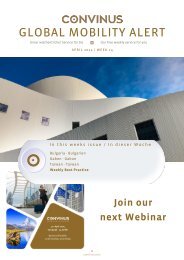CONVINUS Global Mobility Alert - Week 8.2024
Create successful ePaper yourself
Turn your PDF publications into a flip-book with our unique Google optimized e-Paper software.
BEST PRACTICE<br />
Version I: Remote work with predominant activity at the foreign place of residence<br />
Employees who mainly work in their foreign country of residence mostly require a work permit if<br />
they come to Switzerland for a few working days (or for longer periods). If the employees have<br />
EU/EFTA citizenship, the registration procedure can be used for up to 90 days per year. Some<br />
cantons also allow EU/EFTA nationals with a foreign residence and a Swiss employer to obtain a socalled<br />
120-day permit.<br />
There is still a regulatory gap for third-country nationals with Swiss employers who mainly live and<br />
work abroad. The registration procedure cannot be used on the basis of nationality (non-EU/EFTA).<br />
Some, but not yet all cantons, have recognized the problem in practice, so that a 120-day permit<br />
may also be obtained for these third-country nationals.<br />
Excursus: In the case of a foreign employer and occasional working days in Switzerland, the<br />
registration procedure can be carried out for EU/EFTA nationals and, under certain conditions, also<br />
for non-EU/EFTA nationals, provided the employer is based in an EU or EFTA member state. In the<br />
event that the employer is based in a non-EU or EFTA member state, all employees, regardless of their<br />
nationality, can work in Switzerland for 8 days in a calendar year without having to obtain a work<br />
permit. The 120-day permit can be issued for both EU/EFTA nationals and third-country nationals.<br />
Version II: Remote work as a short-term activity abroad<br />
If employees work abroad for a short period of time, the specific formal requirements must be<br />
checked depending on the destination country and the employee's nationality. While Swiss and EU<br />
citizens, for example, can work in other EU countries relatively easily, country-specific registration<br />
regulations (“Posted Workers Directive”) must still be observed. France and Austria in particular<br />
(but not only) are known for their rigid interpretation of these reporting regulations, while the<br />
same EU directive is still handled relatively laxly in Germany.<br />
It should also be noted that third-country nationals with Swiss residency are not allowed to work in<br />
other EU countries just as easily as their colleagues with Swiss or EU/EFTA citizenship. This is<br />
because, in addition to the above-mentioned registration requirements, a work permit for other EU<br />
countries is generally required.<br />
For short-term work assignments in so-called third countries (i.e., outside the EU/EFTA), the<br />
necessary formal requirements for work permits should always be checked and observed. While<br />
some countries are accommodating when it comes to short-term remote work and do not have any<br />
special work permit regulations, many countries require work visas to be obtained locally.<br />
7<br />
convinus.com


